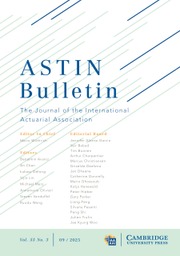Crossref Citations
This article has been cited by the following publications. This list is generated based on data provided by
Crossref.
Chavez-Demoulin, V.
Embrechts, P.
and
Nešlehová, J.
2006.
Quantitative models for operational risk: Extremes, dependence and aggregation.
Journal of Banking & Finance,
Vol. 30,
Issue. 10,
p.
2635.
Bäuerle, Nicole
and
Grübel, Rudolf
2008.
Multivariate risk processes with interacting intensities.
Advances in Applied Probability,
Vol. 40,
Issue. 02,
p.
578.
Eling, Martin
and
Toplek, Denis
2009.
Modeling and Management of Nonlinear Dependencies–Copulas in Dynamic Financial Analysis.
Journal of Risk and Insurance,
Vol. 76,
Issue. 3,
p.
651.
Rachedi, Omar
and
Fantazzini, Dean
2009.
Operational Risk toward Basel III.
p.
197.
Nikoloulopoulos, Aristidis K.
and
Karlis, Dimitris
2009.
Finite normal mixture copulas for multivariate discrete data modeling.
Journal of Statistical Planning and Inference,
Vol. 139,
Issue. 11,
p.
3878.
Jang, Jiwook
and
Fu, Genyuan
2010.
Measuring Tail Dependence for Aggregate Collateral Losses Using Bivariate Compound Cox Process with Shot Noise Intensity.
SSRN Electronic Journal,
Furman, Edward
and
Landsman, Zinoviy
2010.
Multivariate Tweedie distributions and some related capital-at-risk analyses.
Insurance: Mathematics and Economics,
Vol. 46,
Issue. 2,
p.
351.
Asimit, Alexandru V.
Furman, Edward
and
Vernic, Raluca
2010.
On a multivariate Pareto distribution.
Insurance: Mathematics and Economics,
Vol. 46,
Issue. 2,
p.
308.
Sacerdote, Laura
and
Sirovich, Roberta
2010.
A copulas approach to neuronal networks models.
Journal of Physiology-Paris,
Vol. 104,
Issue. 3-4,
p.
223.
Chavez‐Demoulin, Valérie
and
Embrechts, Paul
2010.
Encyclopedia of Quantitative Finance.
Bäuerle, Nicole
and
Blatter, Anja
2011.
Optimal control and dependence modeling of insurance portfolios with Lévy dynamics.
Insurance: Mathematics and Economics,
Vol. 48,
Issue. 3,
p.
398.
Jang, Jiwook
and
Fu, Genyuan
2012.
Measuring Tail Dependence for Aggregate Collateral Losses Using Bivariate Compound Shot-Noise Cox Process.
Applied Mathematics,
Vol. 03,
Issue. 12,
p.
2191.
Anastasiadis, Simon
and
Chukova, Stefanka
2012.
Multivariate insurance models: An overview.
Insurance: Mathematics and Economics,
Vol. 51,
Issue. 1,
p.
222.
Bonnini, Stefano
Salmaso, Luigi
and
Solmi, Francesca
2013.
Statistical Models for Data Analysis.
p.
45.
Su, Jianxi
and
Furman, Edward
2015.
A Form of Multivariate Pareto Distribution.
SSRN Electronic Journal,
Abaurrea, J.
Asín, J.
and
Cebrián, A. C.
2015.
Modeling and projecting the occurrence of bivariate extreme heat events using a non-homogeneous common Poisson shock process.
Stochastic Environmental Research and Risk Assessment,
Vol. 29,
Issue. 1,
p.
309.
Kokonendji, Célestin C.
and
Puig, Pedro
2018.
Fisher dispersion index for multivariate count distributions: A review and a new proposal.
Journal of Multivariate Analysis,
Vol. 165,
Issue. ,
p.
180.
Veraart, Almut
2018.
Modelling, Simulation and Inference for Multivariate Time Series of Counts Using Trawl Processes.
SSRN Electronic Journal ,
Veraart, Almut E.D.
2019.
Modeling, simulation and inference for multivariate time series of counts using trawl processes.
Journal of Multivariate Analysis,
Vol. 169,
Issue. ,
p.
110.
Ramírez-Cobo, Pepa
Carrizosa, Emilio
and
Lillo, Rosa E.
2021.
Analysis of an aggregate loss model in a Markov renewal regime.
Applied Mathematics and Computation,
Vol. 396,
Issue. ,
p.
125869.

